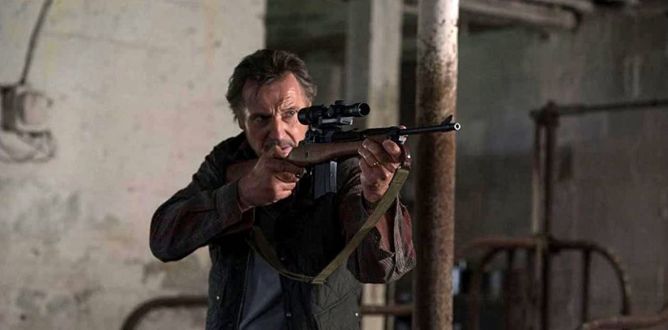The Marksman Parent Guide
The film's low budget has one big benefit: it prevents the producers from paying for elaborate, violent set pieces.
Parent Movie Review
It’s never been easy to scratch a living from a dusty ranch on the Arizona border, but Jim (Liam Neeson) has taken some hard hits over the past few years. His wife’s slow death from cancer proved a costly affair, and even with insurance, the ordeal wiped out his savings. Now all he’s got is a handful of underfed cattle, a worthless plot of land, and frequent troubles with illegal migrants and refugees getting lost on his land. The latter problem proves the most urgent when he finds Miguel (Jacob Perez) and his injured mother, Rosa (Teresa Ruiz) being chased by heavily armed cartel members. A promise to the dying Rosa sets Jim and Miguel on a treacherous journey across the United States, dodging corrupt police, the cartels, and some very determined Border Patrol agents.
As you have no doubt noticed, most Liam Neeson action movies are basically the same. An unassuming man who thinks he has put violence behind him (played inevitably by Neeson) is forced into circumstances which require his “very particular set of skills”, and typically ends when Neeson has finally gunned down/stabbed/blown up the last bad guy. While this isn’t a particularly edifying form of cinema, it occasionally succeeds in being entertaining for adult genre fans. This is definitely not one of those times.
While The Marksman is trying to be a little more heartwarming than the standard Neeson action romp, it doesn’t succeed in being more fun to watch. It’s clearly a lower-budget entry than some of his other work, and that shows in the much slower tempo. The more personal storyline might be interesting if it hadn’t come directly out of a can which stale-dated a few years back. The end result is that watching this movie is a weird, ephemeral experience which requires no active thinking or participation. You just let the slightly oily film of all these stale tropes wash in front of your eyes.
The low budget also means that for a PG-13 Neeson thriller, this is pretty tame. Big stunts, explosions, and gory shootouts all require money and resources which this film simply does not have. While The Marskman isn’t suitable for kids, thanks to the alcoholism and gang violence sprinkled throughout, there isn’t anything here you wouldn’t expect from the trailer. There’s no nudity and rather less profanity than I anticipated – not that this content reprieve makes the movie any more watchable.
This is another one of those films which seems designed for viewing on an airplane: it has just enough going on to keep you awake, but not so much that you might accidentally have a coherent thought. For my money, I’d rather just take a nap and wait for the food trolley to come around, but some flights are longer than others. If you find yourself desperately bored and in need of visual stimuli, this will work just about as well as any other piece of mediocre filmmaking, but don’t go into this expecting…well, anything.
Directed by Robert Lorenz. Starring Katheryn Winnick, Liam Neeson, and Teresa Ruiz. Running time: 108 minutes. Theatrical release March 31, 2021. Updated October 2, 2021
The Marksman
Rating & Content Info
Why is The Marksman rated PG-13? The Marksman is rated PG-13 by the MPAA for violence, some bloody images and brief strong language
Violence: A number of people are shot and killed. Several animals are likewise killed. A person is seen hanging from an overpass, in a condition which implies torture offscreen. A character sustains a nasty scrape from a metal fence. One person is repeatedly stabbed.
Sexual Content: None.
Profanity: There is one use of a sexual expletive and seven uses of scatological curses. There are also infrequent uses of mild profanity and terms of deity.
Alcohol / Drug Use: The protagonist is seen drinking frequently and sometimes to excess. He is also shown driving while under the influence.
Page last updated October 2, 2021
The Marksman Parents' Guide
Refugees and migrants have long struggled to reach the comparative safety of America. How has the United States responded to this urgent humanitarian crisis? What has become of the child detention facilities on the southern border? Do you think the United States has behaved ethically in its treatment of refugees and migrants? How would you balance the need for border security with the need for humanitarian aid and safety for oppressed populations?

